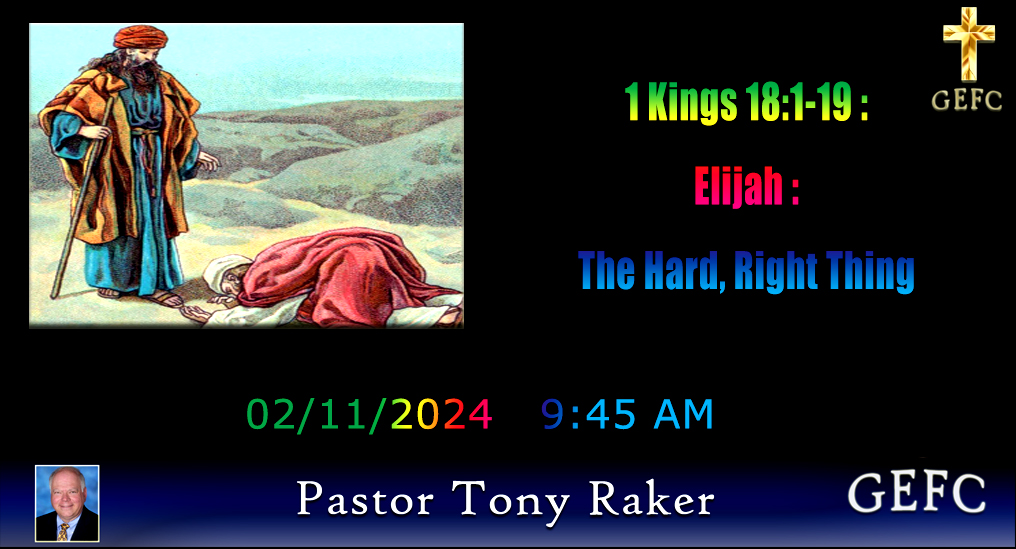
1 Kings 18:1-19 Elijah: The Hard, Right Thing
1 Kings 18:1-19 Elijah: The Hard, Right Thing
The prophet Elijah has been staying with a widow and her son in the village of Zeraphath, and the Lord has miraculously provided oil and flour to get them through the famine. Then the son became ill and died, and Elijah raised him from the dead. Both events are designed to prove Elijah is a real prophet whose words are true because God speaks and works through him as the window, representative of weak believers, is twice touched by God through Elijah – establishing her own faith.
1 Kings 18 finds Elijah and a government official, in obedience to God, choosing to do the hard thing because it was the right thing.
1 Kings 18:1: “After many days the word of the Lord came to Elijah, in the third year, saying, “Go, show yourself to Ahab, and I will send rain upon the earth.”
- Grammatical Usage: “word” or in Hebrew, “dabar” means, “instruction”.
- Literal Interpretation: After many days the instruction of the Lord came to Elijah, in the third year, saying, “Go, show yourself to Ahab, and I will send rain upon the earth.
- Contextual/Comparison: God keeps His Word, God continually uses His Word. In a sense, these are moments that test the authenticity of our faith: both a prophet and a government official proved willing to do hard things, even when they were unpopular or could cost them dearly. But out of their love for God, they did them anyway. Notice from the incident:
- ELIJAH’S CONTEXT
This is indicated in v. 18, and notice about this trial that:
- He remained FAITHFUL to the Lord. These things happened “after many days” in the “third year” of the famine. Days, months, even years had passed, and the world grew drastically worse.
- He HEARS the Lord. These intervening months were a long season of silence from God. The people endured drought, famine, and judgment. Meanwhile, apostasy had grown, and the true prophets were being hunted down and killed. Elijah was a fugitive. But God remained silent. It might have appeared to the faithful remnant in that day as though God was losing, and that wickedness was prevailing, yet God’s man remained attuned to God and “the word of the Lord came to Elijah.”
- He RECEIVES instruction from the Lord. Now the prophet determines to “show himself to Ahab,” and we learn that God has been fully aware of everything going on. Nothing had escaped His notice, and now He is ready to act.
- AHAB’S CONTEXT
This is indicated in vv. 2-6:
- Jezebel is the heart of spiritual rebellion, “Jezebel cut off the prophets of the Lord.” Jezebel is not an Israelite. She is a Sidonian, and when Ahab marries her, she imports her pagan gods of Baal and Asherah. Then she goes a step further, and issues a decree: all the remaining prophets of God be rounded up and executed. Dozens, maybe hundreds, must have been killed in this process.
- God’s judgment presses the crown and the people, “Now the famine was severe in Samaria.”
- Concerned for his crown, Ahab personally seeks water and grass.
- OBADIAH: BROTHER & COLLEAGUE
- Introduced in this passage is a new character: Obadiah. You may recognize his name from the name of a book of the Bible – but that is a different man. That one was a prophet, who would not even be born for another 300 years. This man is described as “over the household” of Ahab, which means he is one of the highest officers of the land, a chief of staff over the royal palace.
- Twice ( 3-4; 13) Obadiah performs a heroic deed in the midst of a national tragedy. Jezebel ordered the execution of all the remaining prophets of God. But Obadiah disobeyed that order, and secretly hid 100 of them. It is an act of holy defiance against a wicked political regime.
- Obadiah disobeyed the queen, but it was counted as an act of great courage and faith because “he feared the LORD greatly” ( 3). In a perfect world, there would be no need to disobey authority. But in a world where institutions are led by fallen human beings, sometimes, those leaders go outside the bounds of their God-given authority and must be disobeyed.
- ELIJAH CONFRONTS AHAB
- Ahab accuses Elijah: “Is it you, you troubler of Israel?” This is taken three ways: the prophet is a personal problem, a problem to the crown and to the nation.
- Elijah:
- Rebuts the charge: “I have not troubled Israel”
- Calls out the offender, and the history of the offender: “you have, and your father’s house”
- Names the specific charge/sin: “you have abandoned the commandments of the Lord”
- Demonstrates the cause and effect: “followed the Baals”
- Cites the scope of the sin: “450 prophets of Baal and the 400 prophets of Asherah”
- Underscores the root of the issue: “who eat at Jezebel’s table”
- Challenges the status quo: “send and gather all Israel to me at Mount Carmel”
- Remains steadfast: “Now therefore”
- Conclusion: Character marks the man and woman in God’s sight and the world’s.
